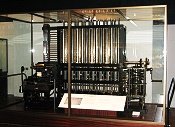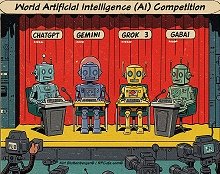Electronics Pioneers & History
- See Full List of AI Topics -

Charles Babbage, born on December 26, 1791, in London, England, was one of the
foremost mathematicians and inventors of the 19th century, best known for his pioneering
work on the concept of a programmable computer. He was the son of Benjamin Babbage,
a banker, and Betsy Plumleigh Teape, who hailed from a relatively affluent family.
His upbringing was comfortable, allowing him access to an education that would later
foster his intellectual pursuits. His father's wealth enabled Charles to attend
some of the finest schools of the time, although his formal education started somewhat
later than usual due to early childhood illness.

Charles Babbage's Difference No. 1 (Wikipedia)
Babbage's schooling began at a local academy in Alphington and later at the King
Edward VI Grammar School in Totnes, Devon. He was a highly curious child with a
keen interest in mathematics, which was noticed early on. This led to him receiving
tutoring from private teachers. His formal higher education commenced at Trinity
College, Cambridge, in 1810, though he later transferred to Peterhouse College,
also at Cambridge, where he graduated with distinction. While at Cambridge, Babbage
became frustrated with the mathematical curriculum, which he felt was outdated compared
to the advances being made in continental Europe. This led him to study advanced
works of mathematics independently, including the works of Isaac Newton and Gottfried
Wilhelm Leibniz. Along with his friends John Herschel and George Peacock, Babbage
helped found the Analytical Society, an organization aimed at reforming the teaching
of mathematics at Cambridge.
His early mathematical career saw Babbage contribute to the field of calculus,
focusing on the functional analysis and series expansions, though it was his fascination
with machinery and computation that would later define his legacy. His interest
in mechanical computation started in the early 1820s, when he designed the Difference
Engine, a mechanical calculator meant to tabulate polynomial functions, which could
potentially aid in the production of mathematical tables. While the British government
initially funded this project, Babbage's relentless pursuit of perfection caused
delays, and the government withdrew support before the machine was completed. Undeterred,
Babbage later conceived an even more ambitious machine, the Analytical Engine, a
general-purpose computer that was programmable using punched cards. The Analytical
Engine was never built during his lifetime, but the concepts underlying it - such
as the central processing unit (CPU) and memory - would influence the design of
modern computers nearly a century later.
Babbage's inventions were not limited to computing machinery. He held several
patents, including one for a type of ophthalmoscope, a device used to inspect the
interior of the eye. He also invented a speedometer and made improvements to the
dynamometer, used for measuring the power output of engines. His contributions to
mechanical engineering, along with his vast theoretical insights, made him a respected
figure in the scientific community, though his perfectionism and occasional inability
to bring his projects to completion left him with a reputation as an inventor whose
visions often exceeded practical realization.
In addition to his work in mathematics and invention, Babbage held a variety
of other intellectual interests, including astronomy and physics. He was elected
a Fellow of the Royal Society in 1816 and later became a founding member of the
Royal Astronomical Society. His contributions to astronomy included calculations
on the motions of the planets and improvements in the accuracy of astronomical observations.
In physics, Babbage was particularly interested in acoustics and light, where he
contributed to the understanding of sound waves and the refraction of light.
Babbage's political views leaned toward reform. He supported free trade and held
progressive ideas on education and science. He was also politically involved in
campaigns advocating for efficiency in public life and scientific administration.
This led to his appointment as the Lucasian Professor of Mathematics at Cambridge,
a prestigious position once held by Isaac Newton. Although he held the post for
over a decade, Babbage's broader interests and increasing focus on his inventions
meant that his contribution to Cambridge as a professor was less significant than
his other achievements.
Religion did not play a central role in Babbage's life, but he held a form of
deism - a belief in a detached creator rather than a personal, interventionist God.
His views on religion were reflective of the rationalist and scientific outlook
that defined much of his approach to life. He believed in the power of human reason
to understand the world and saw scientific inquiry as a way to explore the laws
that governed the universe.
Babbage was also a prolific author, publishing numerous works on mathematics,
mechanics, and social issues. His "Reflections on the Decline of Science in England"
(1830) criticized the scientific community for its lack of progress and was instrumental
in the founding of the British Association for the Advancement of Science. His "On
the Economy of Machinery and Manufactures" (1832) is regarded as one of the first
works on operations research and the division of labor. He was also interested in
cryptography, making early contributions to the field of code-breaking.
His personal life was marked by tragedy. Babbage married Georgiana Whitmore in
1814, and together they had eight children, though only three survived infancy.
The death of his wife in 1827 deeply affected him, and his health declined during
this period. Babbage was plagued by various ailments throughout his life, including
vision problems, which may have influenced some of his work in optics. He lived
primarily in London, though he traveled widely, visiting continental Europe to meet
with fellow scientists and engineers.
Among his contemporary professional relationships, Babbage maintained friendships
with notable figures such as the mathematician and physicist John Herschel, the
astronomer and polymath Sir George Airy, and the Ada Lovelace, the mathematician
who recognized the broader implications of Babbage's Analytical Engine. Lovelace's
insights into how the machine could be programmed to solve problems beyond mere
calculation cemented her place in history as the world's first computer programmer.
Babbage was also connected with the inventor and engineer Isambard Kingdom Brunel,
whose work on large-scale engineering projects was admired by Babbage.
Babbage's intellectual pursuits were vast and multidisciplinary. In astronomy,
he worked on planetary orbits and was involved in improving navigational tools for
sailors, which aligned with his broader interests in scientific precision and practical
application. His work in physics, particularly acoustics and optics, complemented
his mathematical inquiries and his commitment to improving scientific instruments.
In his later years, Babbage became somewhat of a recluse, continuing to work
on his engines but finding himself increasingly marginalized from the scientific
establishment. Despite his many achievements, his inability to complete many of
his projects, including the Analytical Engine, clouded his legacy during his lifetime.
He died on October 18, 1871, in London, largely unrecognized for the profound impact
his ideas would have on the future of computing. It was not until the 20th century,
when his designs for the Analytical Engine were rediscovered, that Babbage was fully
acknowledged as a pioneer of the digital age.
 This content was generated by primarily
with the assistance of ChatGPT (OpenAI), and/or
Gemini (Google), and/or
Arya (GabAI), and/or Grok
(x.AI), and/or DeepSeek artificial intelligence
(AI) engines. Review was performed to help detect and correct any inaccuracies; however,
you are encouraged to verify the information yourself if it will be used for critical
applications. In all cases, multiple solicitations to the AI engine(s) was(were)
used to assimilate final content. Images and external hyperlinks have also been
added occasionally - especially on extensive treatises. Courts have ruled that AI-generated
content is not subject to copyright restrictions, but since I modify them, everything
here is protected by RF Cafe copyright. Many of the images are likewise generated
and modified. Your use of this data implies an agreement to hold totally harmless
Kirt Blattenberger, RF Cafe, and any and all of its assigns. Thank you. Here is
Gab AI in an iFrame. This content was generated by primarily
with the assistance of ChatGPT (OpenAI), and/or
Gemini (Google), and/or
Arya (GabAI), and/or Grok
(x.AI), and/or DeepSeek artificial intelligence
(AI) engines. Review was performed to help detect and correct any inaccuracies; however,
you are encouraged to verify the information yourself if it will be used for critical
applications. In all cases, multiple solicitations to the AI engine(s) was(were)
used to assimilate final content. Images and external hyperlinks have also been
added occasionally - especially on extensive treatises. Courts have ruled that AI-generated
content is not subject to copyright restrictions, but since I modify them, everything
here is protected by RF Cafe copyright. Many of the images are likewise generated
and modified. Your use of this data implies an agreement to hold totally harmless
Kirt Blattenberger, RF Cafe, and any and all of its assigns. Thank you. Here is
Gab AI in an iFrame.
AI Technical Trustability Update
While working on an update to my
RF Cafe Espresso Engineering Workbook project to add a couple calculators about
FM sidebands (available soon). The good news is that AI provided excellent VBA code
to generate a set of Bessel function
plots. The bad news is when I asked for a
table
showing at which modulation indices sidebands 0 (carrier) through 5 vanish,
none of the agents got it right. Some were really bad. The AI agents typically explain
their reason and method correctly, then go on to produces bad results. Even after
pointing out errors, subsequent results are still wrong. I do a lot of AI work
and see this often, even with subscribing to professional versions. I ultimately
generated the table myself. There is going to be a lot of inaccurate information
out there based on unverified AI queries, so beware.
Electronics & High Tech
Companies | Electronics &
Tech Publications | Electronics &
Tech Pioneers | Electronics &
Tech Principles |
Tech Standards Groups &
Industry Associations | Societal
Influences on Technology
|










